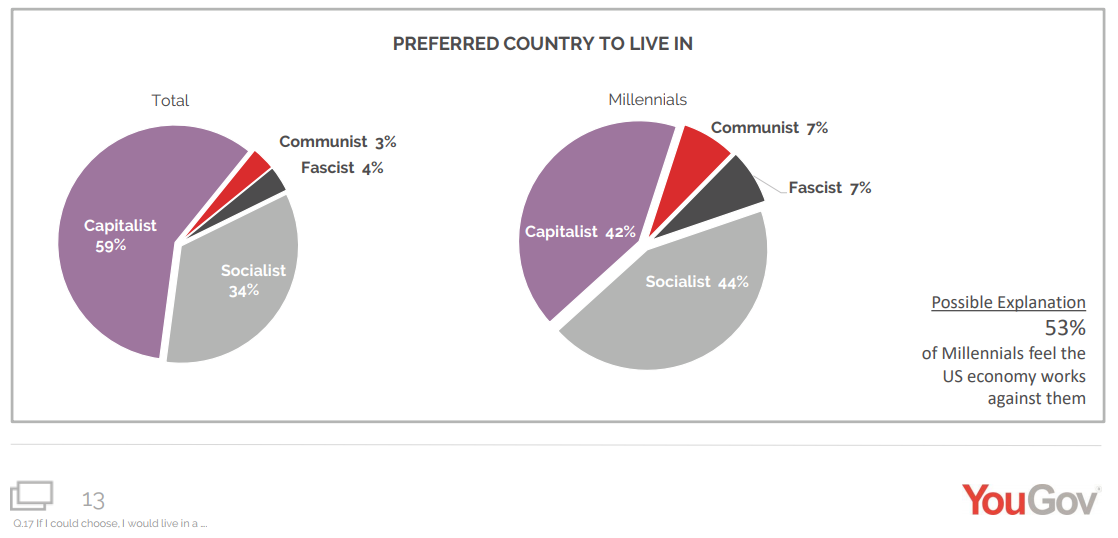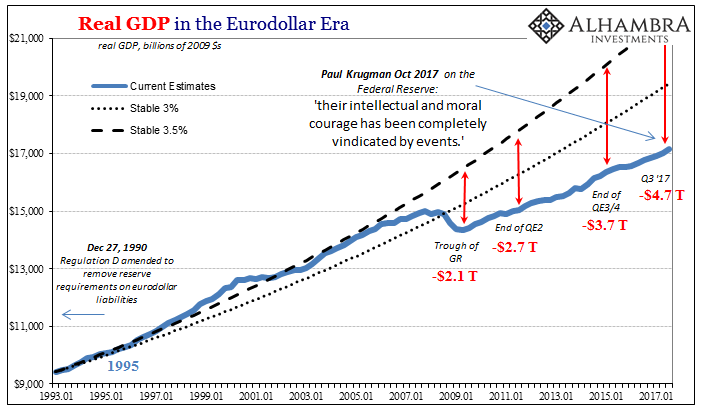In October, YouGov partnered with the Victims of Communism Memorial Foundation to conduct the latter’s annual poll on US attitudes towards socialism. There was, as usual, some good and bad news contained within the results. The number of overall Americans who believe communism was and is still a problem, for example, rose 5 points to 75%. The bad news is that a quarter of us either aren’t sure and don’t think that there is anything wrong with that particular political system.
That is what communism and socialism ultimately are, though it is largely framed/misconstrued as an economic question. Control over the means of production is, after all, a political settlement more than an economic issue.
Of those who answered in that minority, sizable proportions of younger Americans find themselves more and more at least attracted to the idea. A majority of millennials claim that they would prefer to live in either a socialist country (44%) or an outright communist one (14%). Only 42% responded with a preference for living in a capitalist nation.
We should be clear that millennials don’t appear to be in danger of joining any reformed Red Guards. The number of them who hold favorable opinions of communist leaders past (Marx, Lenin, Mao, Stalin) and present (Putin) are down significantly in the last year. Still, the disfavor for capitalism is a potential problem for social, political, and economic stability in not just this country.

Fortunately, among the detailed findings of the survey YouGov notes one big reason why that is. Slightly more than half of young adults in the US claim the US economy works against them.
It is here that we have to have a great deal of sympathy for their plight. It’s easy to dismiss these concerns as the lazy growls of the most pampered generation in history. That’s not analysis, however, more the usual generational strife that accompanies the basic passage of time (get off my lawn!!!).
A millennial is more likely to have gone to college, obtained a degree, and become highly indebted for doing everything they were “supposed to.” The costs of doing all that, obviously, have risen alarmingly in the past few decades, but even that obscures somewhat the real issue.
At the end of the educational process was supposed to be a better future, employment and otherwise. Increasingly, however, there is no starting point.
For much of the first part of the lost decade since August 9, 2007, the proverbial millennial stuck in their parents’ basement was an intuitive cliché. The thirties gave us the emblematic vision of the poor sap stuck in a bread line, while the Great “Recession” has hit particularly the young and college educated who have been reduced to getting their bread in the house they grew up in. It has been, as Pew Researcher Richard Fry noted in a report last year, “part of the private safety net.”
The incidence of this phenomenon has risen, however, in the past few years rather than abated. More Californians as Americans are stuck in this predicament than ever before, significantly more even than during the first few years of “recovery.” This has, of course, confounded many people largely social scientists who can’t detect the cause. After all, the unemployment rate has fallen to an unbelievably low level and all social science expected that when recovery happened young adults would be dying to get on with their adult lives.
You may not agree with it, but you can at least understand it. Who in that position wouldn’t feel as if the deck was stacked against you? If we live in a nominally capitalist society and this is what capitalism has to offer, then why not socialism or something else more like it?
Lack of economic growth and the absence of opportunity that follows it are like a pressure cooker increasing exponentially the tensions on social divisions that have always existed, and always will. These young people and many older Americans like them constantly hear from authorities that there is nothing wrong, the economy fully recovered, and sincerely struggle how to reconcile that official message with their own perceptions of reality (a reality that is very different outside of the NYC-DC corridor). Rather than reassure, such misplaced reassurance only sharpens these divisions that much more.
The primary risks for the future are not really economic in nature. The world over the last ten years has already suffered the great damage that has come with the breakdown of the eurodollar system. What’s left instead is increasingly the fallout from it. Social stability isn’t always a derivative of economic stability, but it is in most cases especially in times like these.
That’s why so many millennials say that might prefer socialism to capitalism even though more often than not they can’t correctly identify what socialism actually is. That’s really the good news buried inside all the rest mostly bad news. What it likely means is that all is not lost, these changing attitudes while congealing not yet cemented in stone. The next generation of adults (though Generation Z is starting to come of age now, too) isn’t quite yet a sleeper cabal of hardened Marxists already set in a pre-revolutionary state waiting only for the final signal from Moscow (or Beijing) to launch the global “people’s” revolution.
Instead, the youth of America are plain fed up with an economy, not the system, that doesn’t work. They are only seeking alternatives because, thanks to Economists, they haven’t been given one (this is true for more than millennials, of course). This is, supposedly, a recovery and according to many of those Economists maybe even a good one. And they say this in the name of capitalism.
Fix the economy and the rest will take care of itself. The clock, however, is clearly ticking.


Stay In Touch